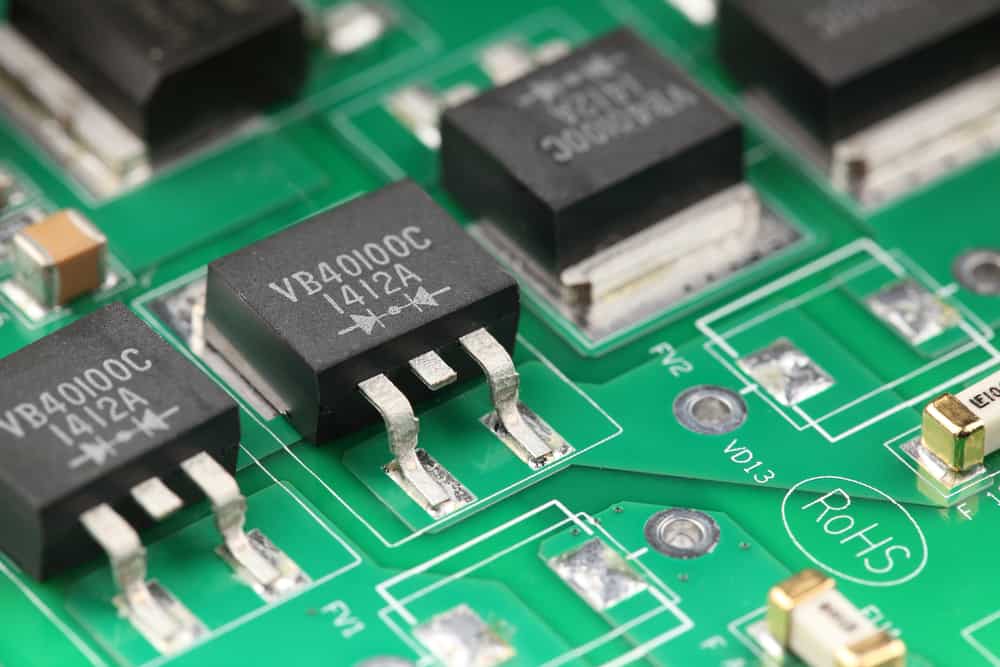
Schottky diodes and rectifiers mounted on a PCB
A Schottky diode is a semiconductor diode known for its fast switching characteristics and low forward voltage drop. The diode, named after physicist Walter H. Schottky, is built with a metal-semiconductor junction rather than a traditional semiconductor-semiconductor junction found in regular diodes. This metal-semiconductor junction results in a lower forward voltage drop than conventional diodes. The lower voltage drop makes Schottky diodes suitable for high-frequency applications and where minimizing power losses is crucial.
“Schottky diode” and “Schottky rectifier” are often used interchangeably, but there can be subtle differences in their usage. As noted above, a Schottky diode incorporates a metal-semiconductor junction, resulting in a lower forward voltage drop than traditional semiconductor-semiconductor diodes. A Schottky rectifier, on the other hand, emphasizes the use of a Schottky diode in rectification circuits. A rectifier is a device that converts alternating current (AC) into direct current (DC). While all Schottky rectifiers are Schottky diodes, not all Schottky diodes are rectifiers. When implementing this device in your PCB design, it is important to leverage the data and information provide in the Schottky diode datasheet.
Schottky Diode: Features and Applications
Schottky diodes have several attractive features and are used for various switching applications. These are evident by examining the features and applications from the IXYS DSS25-0025B Schottky diode datasheet below:
|
Schottky Diode Datasheet for the IXYS DSS25-0025B |
|
|
Features |
Applications |
|
Very low forward voltage |
Rectifiers in switch mode power supplies |
|
Extremely low switching losses |
Free wheeling diode in low voltage converters |
|
Improved thermal behavior |
RF mixers and detectors |
|
High-reliability circuit operation |
High-speed digital circuits |
|
Low-voltage peaks for reduced protection circuits |
Solar cells and photovoltaic systems |
|
Low noise switching |
Automotive components |
It is evident from this sample device that Schottky diodes can be used in a wide range of electronic systems, where their unique properties can improve both efficiency and performance.
Schottky Diode: Characteristics and Specifications
In a Schottky diode, the current flows forward when sufficient forward voltage is applied. Due to the lower forward voltage requirement, switching speeds and system efficiency can be improved. Below is a table of the diode’s maximum ratings and electrical characteristics taken from the IXYS DSS25-0025B datasheet.
Maximum Ratings and Electrical Characteristics
TO-220 package dimensions for the IXYS DSS25-0025B
PCBA Design With the Schottky Diode Datasheet
Schottky diode datasheets are invaluable resources that should be relied upon when designing circuit boards that implement this device. In addition to the electrical and thermal specifications that define range of operation, the datasheet will typically include characteristic curves. These graphs provide you with a view of voltage, current, impedance, and/or power parametric behavior over the recommended range for the diode.
The datasheet will also give you package dimensions that will help you place the component and run traces effectively. This and other helpful information is described in the Schottky diode datasheet (DSS25-0025B) contains helpful information. However, you must ensure that your component CAD model and data are accurate and from a trusted source, like Ultra Librarian.
IXYS DSS25-0025B component listing in UL
If you’re looking for CAD models for common components or design information like how to best use a Schottky diode datasheet, Ultra Librarian helps by compiling all your sourcing and CAD information in one place.
Working with Ultra Librarian sets up your team for success to ensure streamlined and error-free design, production, and sourcing. Register today for free.